
Two young women opened a pie shop in the cutest little cottage on what was the edge of the Bishop Arts District in 2012.
Now Emporium Pies’ flagship store sits at the center of the district. Wedged between Paradiso and AJ Vagabonds, it is the smallest of the locally owned chain’s four locations.
The shop at 314 N. Bishop is where Lake Highlands neighbor Megan Wilkes, 35, and her then-business partner Mary Sparks baked, sold and marketed pies six days a week for a year and a half.
“A guy came in about five years ago and said, ‘I thought they said two young girls ran this place!’ I feel like the president; I’ve aged 30 years since I opened, like Obama with his grey hair,” she says.
The little pie shop in Bishop Arts went from baking five pies at a time to operating a 6,000-square-foot production facility that turns out thousands of pies a month. The company, which has more than 50 employees, offers paid time off and a living wage for retail and production workers.
Ten people worked elbow-to-elbow in that tiny old house, ovens blazing year-round and lines out the door, before they opened a second location in Downtown McKinney in 2014.
That gave them the economy of scale to rent their first commissary kitchen and remove the baking operation from the retail.
Opening the Deep Ellum shop in 2016 enabled the Pie Palace.
The Pie Palace is a light-industrial facility near Lake Cliff Park where everything is produced for Emporium Pies locations in McKinney, Deep Ellum, Fort Worth and Bishop Arts. Frozen cherry pies are also produced for delivery nationwide via Goldbelly and UPS.
The company runs its own delivery service because its cargo is too fragile for Uber Eats, etc. A fleet of three Emporium Pies vans delivers all over the Metroplex.
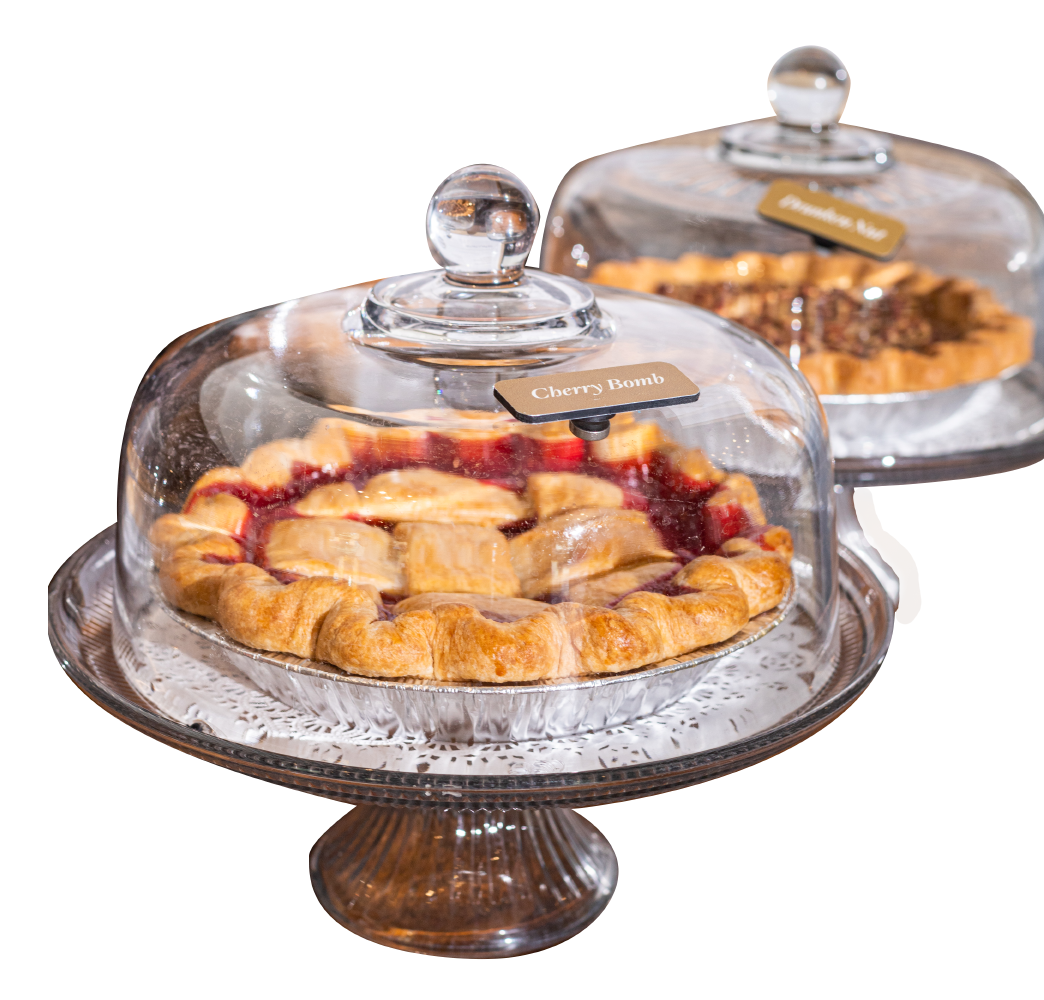
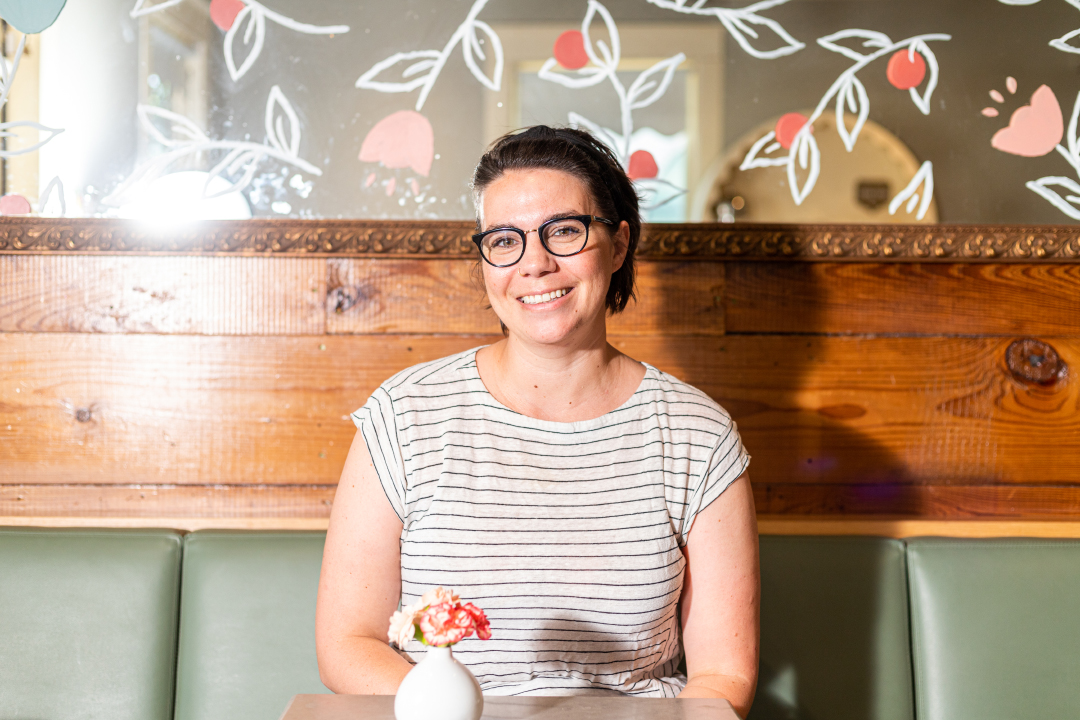
Pie by the numbers
Emporium pies needs to sell about 3,750 slices of pie each month to make rent at its four stores.
The company buys about 125,000 pounds of butter a year.
The Lord of the Pies, a deep-dish apple pie, is so heavy that a tray of three of them weighs about 40 pounds.
Heavy-duty baker’s racks cost about $350 each and require frequent replacement because the weight of the pies wears out the slots.
Pie sciences
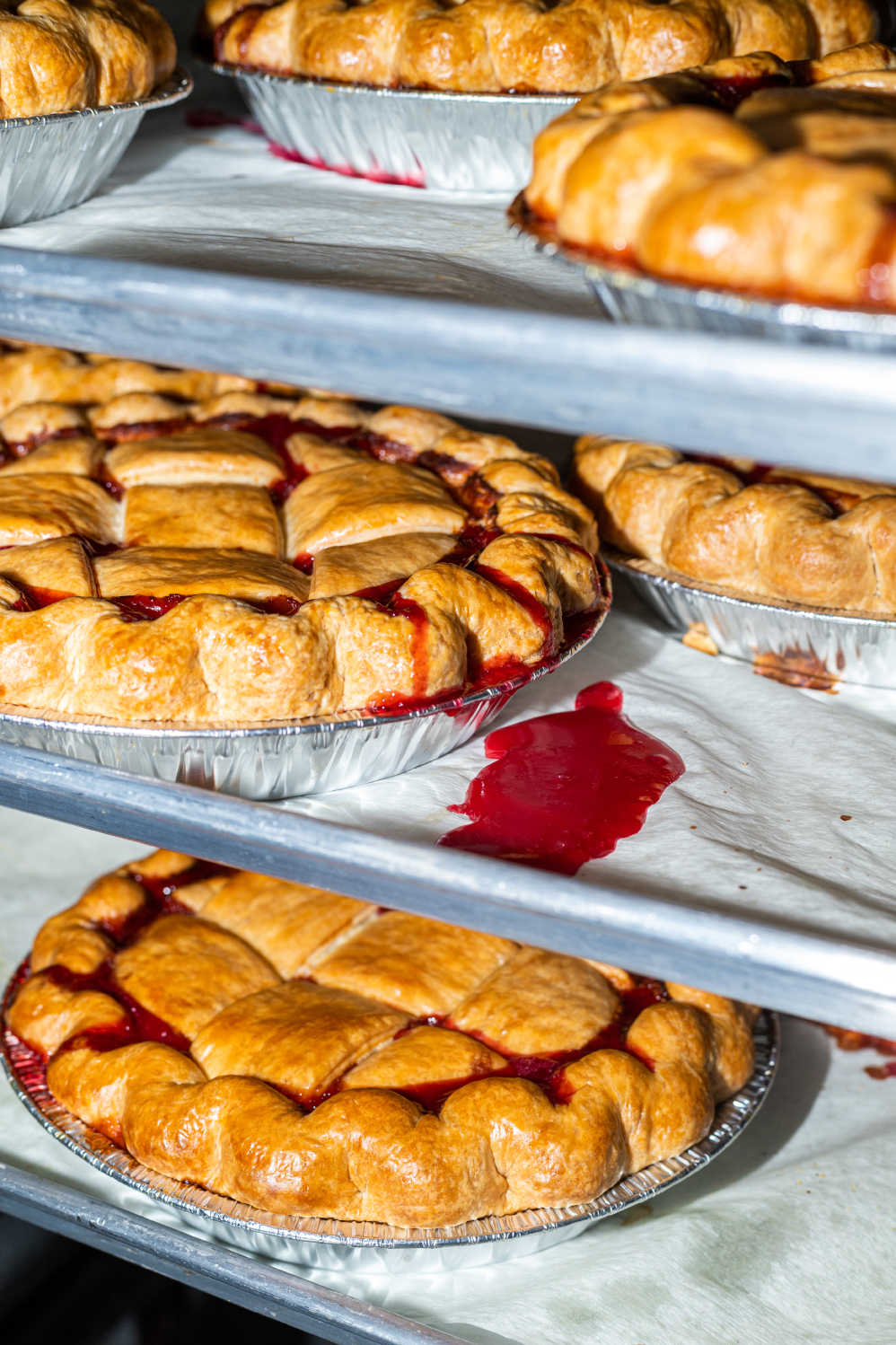
One thing about Megan Wilkes: She loves a play on words.
That’s evident in product names like “lord of the pies” and “papa don’t peach,” and in her email signature, which describes her as Entre-PIE-neur.
The company recently sold its original delivery vehicle, a Ford Transit Connect named Vanny DeVito.
Auto-pie-lot is the algorithm the kitchen managers use to project how much pie to make so that there’s very little waste.
“That’s our closely monitored piece of intellectual property,” Wilkes says. “Because you can get out of control, waste-wise. And what a terrible thing, to squander people’s work.”
Auto-pie-lot contains data from previous years and how much sales are up year-over-year. The stores report any waste daily as well as what reason there might be for that, such as rain. Weather forecasts are also considered in the open-source document.
The “pie-culator” within Auto-pie-lot crunches all of that into daily quotas, and Wilkes says it’s quite accurate.
The algorithm tells them how much pie to deliver to the stores each day before the vans — Pie-lennium Falcon, Starship Enter-pies and Pie-metheus — head out.
“If we make a little bit too much, we freeze it and put it into ice cream,” Wilkes says.
Did you know?
The original house that became Emporium Pies was at 316 N. Bishop Ave. When the pie-shop owners added an attic apartment, they gave it the old address so their shop could have pi: 314 N. Bishop.
The art of management
Emporium Pies recently invested in equipment that eliminates repetitive tasks that are hard on the body.
Swiss machinery rolls out the dough and cuts it, tasks workers used to do by hand.
“But we still make the dough by hand and crimp every single pie with our fingers,” she says.
Portion fillers mean employees no longer have to scoop filling into each shell, a repetitive motion that could cause injury over time.
Those innovations also make the pies more consistent, Wilkes says.
Pie fillings are still cooked manually on a stovetop, and everything is done in batches of 25 pies, a number that’s compatible with the Auto-pie-lot algorithm.
The pies are baked in two rotating industrial ovens that cost about $65,000. Workers can roll the racks into the ovens and close the doors without stooping or reaching.
“The story isn’t that Megan and Mary built a pie shop,” Wilkes says. “It’s that we’ve always had people who are incredible and are able to help us with it.”
Pie Palace employees start out as bakers-in-training until they’re experienced enough to become bakers, which comes with a raise, and then shift leaders. They can work up the ranks, and the pay scale, at their own pace.
A star chart tracks who’s been trained at which tasks and how well they know them.
Most current employees are shift leaders, meaning they are capable of running the kitchen day-to-day, Wilkes says.
“It takes a long time to learn everything,” she says. “Our menu changes every few months, so it’s like a year to get fully trained up.”
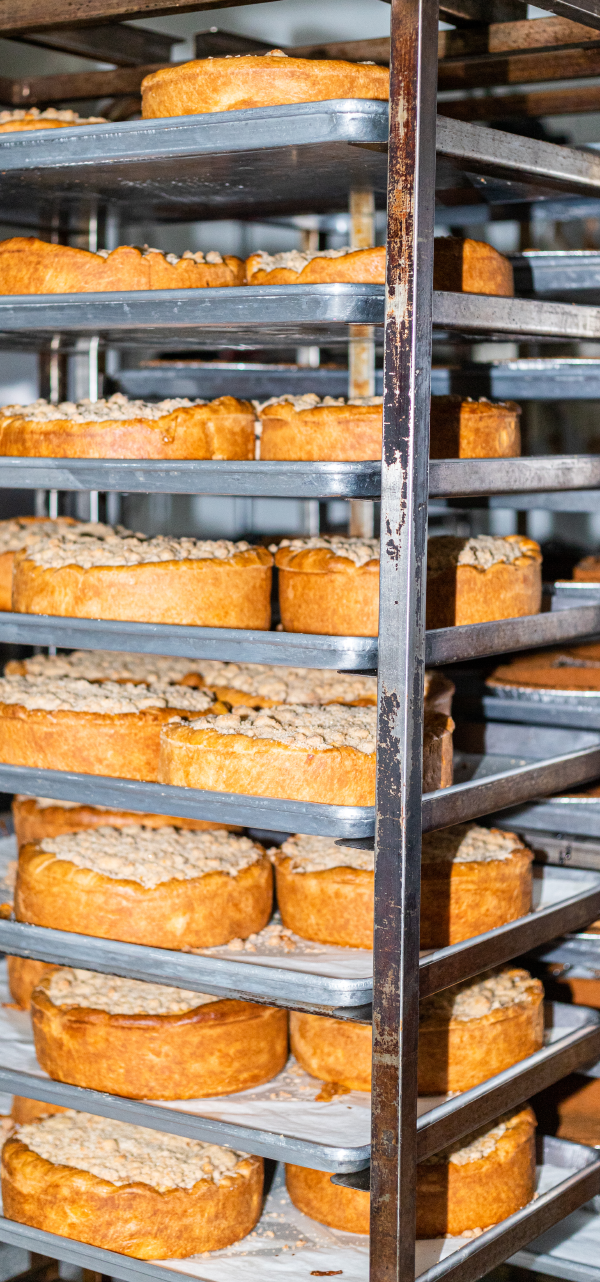
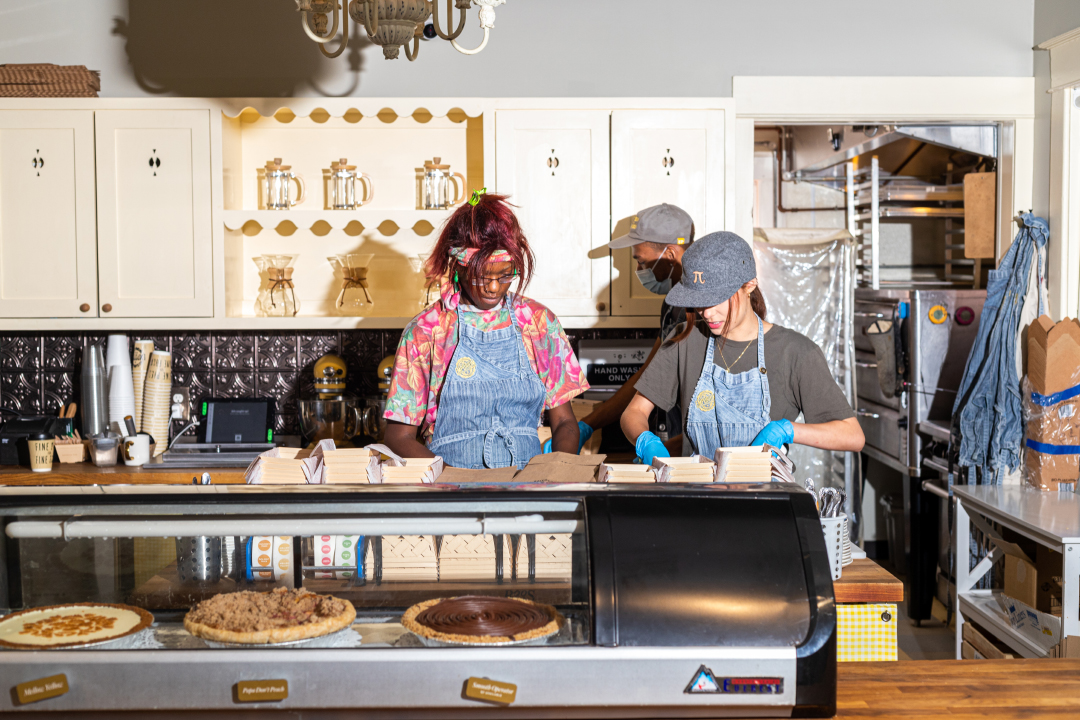
“Our business plan was not for success. It was for like, ‘OK, if pie doesn’t work, we can add cookies to the menu.’”
Drinking from a firehose
The first five years of Emporium Pies’ existence was reacting to overwhelming demand. Figuring out how to scale up their recipes and production on the fly to satisfy immediate demand. Making a plan for their No. 1 holiday, Thanksgiving.
“Our business plan was not for success,” she says. “It was for like, ‘OK, if pie doesn’t work, we can add cookies to the menu.’”
If they could pay themselves and two or three other employees, she and Sparks thought that would be a success.
The shop sold 300 pies in three hours on its first official day in business in 2012, and it sold out of Thanksgiving pies three weeks before the holiday.
“People were like, ‘How does a pie shop not have pies for Thanksgiving?’”
Their Thanksgiving ordering and pick-up system now runs like a machine.
Wilkes says she began coming up for air about five years ago, applying for loans instead of operating on cashflow and planning more for the future.
That’s also when the company began to codify its systems and processes into employee handbooks. The Auto-pie-lot algorithm came together less than two years ago, combining multiple spreadsheets that Sparks developed over the years.

What’s next
“To be a good steward of the amount of space and equipment and talent that we have, we’re going to need to open more stores,” Wilkes says.
Emporium Pies opened a new store every two years, and she is itching for the next one.
With a degree in interior design and an MBA she has a formula for locations.
“I’m the kind of person who falls in love with a building first,” she says.
But there also has to be a barbecue place and a burger place withing walking distance.
The Deep Ellum shop triangulates between Pecan Lodge and Easy Slider.
That store opened because the Bishop Arts store was “maxed out,” Wilkes says.
“We knew we wanted another Dallas location,” she says. “It’s really a proxy for Bishop Arts, and that store has done really well for us.”
No silver bullet
March 14 is the shop’s second-busiest day of the year because the date is 3.14, pi day.
In 2020, that was the day before Dallas County issued shelter-in-place orders because of the coronavirus.
Wilkes and Sparks saw it coming, and the company managed to sell its thousands of pi-day pies and rent three trucks to move all the furniture out of the shops overnight. They devised contactless systems, where customers could order, pay and receive their pies through a window.
That was paid for by a Restaurant Revitalization Fund grant from the U.S. Small Business Association.
Since then, there have been some challenges with supplies. Wilkes purchased cardboard-box futures after a shortage left her scrambling to find them for Thanksgiving last year.
Insect-borne cherry diseases have caused woes this year.
Employee retention has been high, she says. Anyone exposed to COVID-19 was given immediate two weeks paid time off.
The pandemic slowed the company’s growth a bit, but a PPP loan and business savings provided insulation.
“It really does take the whole team to get anything done every single day. It’s the entire team,” she says. “And that’s not just us, that’s every restaurant.”
Migrating north
Wilkes and her husband, Paul, moved with their two daughters from the Winnetka Heights neighborhood of Oak Cliff to Lake Highlands a few years ago.
“Of course, I found a house that I loved,” she says. “It’s a ’70s modern built for this one guy, and it only had two owners.”
Their kids are in RISD schools, and they love Zato Thai Cuisine & Sushi Bar.
A Lake Highlands outpost of Emporium Pies is not out of the question.
“It’s our fifth store in 10 years,” she says. “I want it to be a homerun, so it feels a little bit scary. There are so many good neighborhoods in Dallas where I think it would thrive.”





